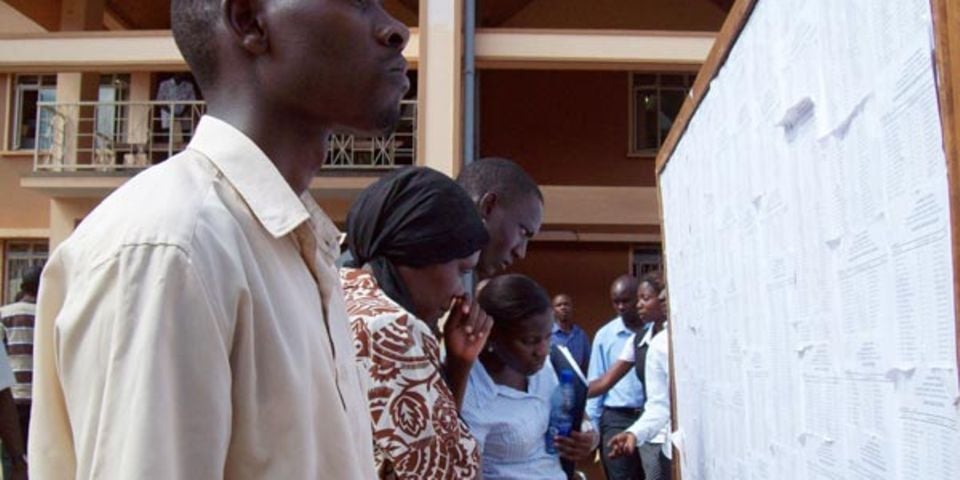Prime
MPs start ‘expired’ degrees probe today

State Minister for Higher Education John Chrysostom Muyingo presents a statement about the degrees saga before Parliament on May 24, 2023. PHOTO/DAVID LUBOWA
What you need to know:
- Reports emerged on Monday that a number of universities and tertiary institutions were teaching expired courses.
- The revelation caused and continues to cause alarm and panic across the country with Ugandans wondering about the programmes they are studying or studied.
- The description of programmes as expired on the NCHE website has led to conclusion that affected degrees and other qualifications are null and void.
- But the NCHE has since responded, insisting that all qualifications obtained in all previously accredited courses are valid. The same council, however, did not clarify how its position holds if an affected programme, of which they are over 2,200, had not been duly re-accredited.
Parliament’s Committee on Education will today start examining the saga of ‘expired’ academic and professional programmes which are reportedly being taught illegally at Uganda’s public and private universities, and other institutions of higher learning.
The saga broke this week as news media reported shock revelations that some Ugandan degree holders are having their applications for further studies abroad rejected on grounds that what they studied was not accredited.
Under Uganda’s laws, the National Council for Higher Education (NCHE) is mandated to accredit both universities and programmes taught, and other institutions of higher learning.
An institution is only supposed to operate and run programmes upon accreditation, rendering any academic qualification attained in places without due accreditation null and void. And this is the interpretation of the law which is being made abroad, and hence the rejection some of the country’s graduates have faced.
The communication about commencement of inquiries was made yesterday by Mr John Twesigye Ntamuhiira (Bunyaruguru), the committee chairperson.
“We have been receiving several communications regarding these courses which they regard to have expired and have realised that the communication from Makerere University, Kyambogo University and what the minister has presented seem to be conflicting,” Mr Ntamuhiira said.
“So, what we have decided as a committee is to invite the Ministry of Education and Sports, and relevant agencies to interact with them tomorrow (Thursday) and possibly Friday to analyse the matter,” he said.
Ministry’s view
In a statement also read yesterday by State Minister for Higher Education Mr John Chrysostom Muyingo, government said the now contentious word, ‘expiry’, as used by the NCHE to describe unaccredited programmes, means that they only need periodic evaluation.
“Expiry of accreditation, as reflected on the National Council for Higher Education (NCHE) website, means that the programme needs re-assessment to establish whether the key aspects upon which accreditation was granted is still in place. No programme will receive this label once institutions conform to the requirements for re-assessment,” he said.
Institutions with programmes requiring re-assessment, Mr Muyingo added, have been urged to submit them for re-assessment by November 30
Institutions are required to submit programmes for re-assessment every five years (for Masters, Bachelors, Diplomas, and Higher Education Certificates) and every ten years for PhDs to assure quality and continued relevance. This publication on Tuesday carried responses from universities and tertiary institutions over the issue of teaching expired courses.
Yesterday, Deputy Speaker Thomas introduced a new dimension to the saga when he observed that reviewing programmes every five years may not be reasonable in some cases.
“When you say a Bachelors’ degree, the curriculum is reviewed after every five years, now you have a course like medicine, which takes five years.
So, it means, once I am admitted, by the time I am graduating, my curriculum is expiring. So, how do you look at a five-year course and say that its curriculum can expire after every five years? It is not tenable,” Mr Tayebwa said.
He also said NCHE’s use of the word ‘expired’ has caused a national crisis.
“Sometimes we love using strong words without knowing the impact they can have one day. Why use the word expiry?” Mr Tayebwa asked.
But Ms Christine Kaaya Nakimwero (Kiboga) said universities which continue to enroll and graduate students in programmes which NCHE has not accredited are to blame for the mess.
Other legislators, including Ms Connie Galiwango Nakayenze (Mbale City) and Ms Menya Paska Aciro (Pader) said the crisis is tormenting families with mental distress being suffered by both students, former affected former students and their parents or gaurdians.
Attorney General Kiryowa Kiwanuka moved to try and settle nerves, turning attention to what the law says.
“It is an administrative function that the National Council for Higher Education is carrying out to review the courses. The use of the word expiry may have been a bit overboard but that was their choice and I think they are going to correct that. But, under our law, there is no provision for expiry of courses. Courses are continuous. So, the country needs to remain calm,” Mr Kiwanuka said.
The Attorney General, who is chief legal advisor to government also told MPs that “there is no law that provides for expiry of courses. The courses are still valid”. “It was just I think a bad choice of word but I think the review is going on and NCHE is continuing to review the courses to make them applicable to the changing circumstances in the world. But the country needs to be assured [that] all the degrees that have been issued are well within the provisions of the law,” he added.




